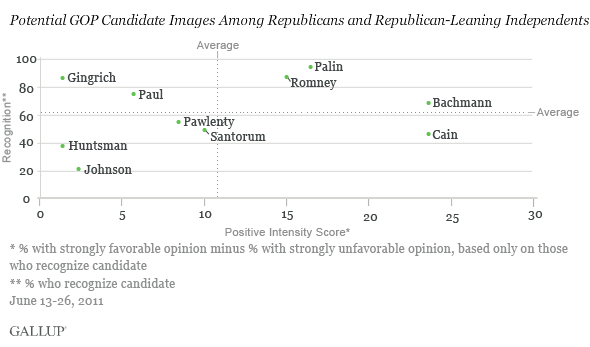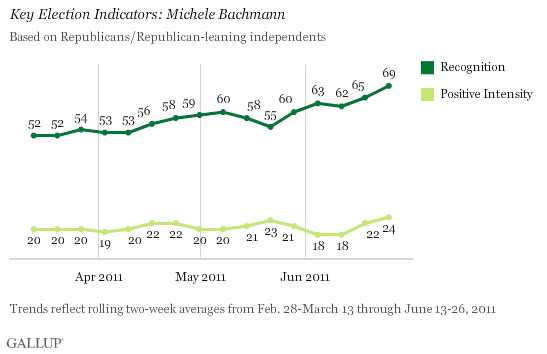PRINCETON, NJ -- Minnesota Rep. Michele Bachmann, who formally announced her presidential candidacy Monday in her hometown of Waterloo, Iowa, enters the race with 69% name recognition among Republicans and ties for the highest Positive Intensity Score of any GOP candidate Gallup tracks.

Bachmann finds herself in a relatively positive position among Republicans as she begins her formal campaign. Her name recognition is up to 69% for the two-week period of June 13-26, having climbed from 52% in late February/early March. This places her fifth among the most well-known Republicans Gallup measures, behind Sarah Palin, Newt Gingrich, Mitt Romney, and Ron Paul, but well ahead of Tim Pawlenty, Jon Huntsman, and several other competitors. Bachmann's Positive Intensity Score of 24 ties with Herman Cain's as the highest such score of any candidate, and is her highest to date. Bachmann's ability to maintain her relatively high Positive Intensity Score as she has become better known distinguishes her from several of her competitors.

Cain's name recognition is also up, from 21% in March to 46% today, although his Positive Intensity Score is down slightly from 28 -- his highest -- a few weeks ago.
Romney is widely considered the front-runner in the GOP race, based on his strong positioning on various trial heat measures, including Gallup's. Romney's name recognition among Republicans is 85% and has stayed roughly the same all year. The former Massachusetts governor, who plans to travel to London in July to solicit campaign contributions, is generating slightly less enthusiasm among Republicans now than previously. His Positive Intensity Score of 15 is down from 18 last week and 19 the week before. More specifically, 18% of Republicans who recognize Romney say they have a strongly favorable opinion of him, while 3% have a strongly unfavorable opinion. By contrast, 26% of those who recognize Bachmann have a strongly favorable opinion of her.
Although former Utah Gov. and former Ambassador to China Huntsman received considerable news coverage last week with the formal announcement of his candidacy, his image among Republicans is getting worse, not better. His name recognition for the June 13-26 period is 39%, up from 20% earlier this year, but is the second lowest of any candidate Gallup tracks. More significantly, Huntsman's Positive Intensity Score is down to 2 from 5 a week ago. Earlier this year it had been as high as 15. Only 5% of Republicans who recognize Huntsman have a strongly favorable opinion of him, while 3% say they have a strongly unfavorable opinion.
Former Speaker of the House Gingrich's image among Republicans is also at 2, tied with Huntsman for the lowest of any Republican measured. Gingrich's image has become increasingly less positive as he has sustained media scrutiny of staff departures, comments about his fellow Republican Paul Ryan's proposed Medicare reform plan, and reportedly large personal charge accounts at Tiffany's. Gingrich is well-known, and his current 86% recognition among Republicans is second only to Sarah Palin's.
Palin herself is in Iowa Tuesday, ostensibly not to campaign, but to screen the documentary "The Undefeated" about her life. She has still not indicated whether she will run for the GOP nomination. Palin has the advantage of nearly universal name recognition among Republicans, and her current Positive Intensity Score of 17 puts her slightly above Romney and behind only Bachmann and Cain.
Former Minnesota Gov. Pawlenty's name recognition is now at 57%, up 18 points from January, but there are no signs that he is creating an enthusiastic response from Republicans; his Positive Intensity Score is 8, his lowest to date.
Former Pennsylvania Sen. Rick Santorum's name recognition has not moved as much as has been the case for other candidates; at 49%, it is little different from the 47% Gallup found in late April and early May. Santorum's Positive Intensity Score is 10, similar to where it has been for the past month but down from the 12 to 16 range seen earlier in the year. In similar fashion, Texas Rep. Ron Paul's name recognition has been stable all year, albeit, at 77%, higher than Santorum's. Paul's Positive Intensity Score is at 6, his lowest to date, and well less than half of where it was earlier in the year.
Former New Mexico Gov. Gary Johnson is in many ways "the invisible candidate." Only 21% of Republicans recognize his name, the same as in early May and the lowest of any candidate Gallup tracks. His Positive Intensity Score remains in the low single digits, although it is back into positive territory this week at 3. Johnson is a highly motivated athlete who has climbed Mt. Everest, and his visit to New Hampshire last weekend included not just campaigning, but also competing in a White Mountain bicycle race.
Implications
Two Republican presidential candidates -- Bachmann and Cain -- stand out significantly above the others in terms of the positive intensity they generate from Republicans who know them. These two candidates have generally received the most positive emotional responses from Republicans all year, and, in the case of Bachmann, this has now manifested itself in strong showings in trial-heat polls conducted in Iowa and an increased national stature.
On the other hand, the images of other candidates who have announced their candidacies have become less rather than more positive. Gingrich, Huntsman, Paul, and Pawlenty all now have lower Positive Intensity Scores than earlier this year, even as they have campaigned more actively.
Romney too has seen his Positive Intensity Score slide slightly in this latest reporting period, and on this dimension he sits well behind Bachmann and Cain -- although ahead of most of his other competitors except for the unannounced Palin.
Survey Methods
Results are based on telephone interviews conducted as part of Gallup Daily tracking June 13-26, 2011, with random samples of Republicans and Republican-leaning independents, aged 18 and older, living in all 50 U.S. states and the District of Columbia. Questions asking about the 10 potential candidates measured in this research were rotated among randomly selected samples of Republicans each night; over the 14-day period, each candidate was rated by a minimum of 1,500 Republicans and Republican-leaning independents.
For the overall ratings of each potential candidate among Republicans and Republican-leaning independents, including recognition scores, one can say with 95% confidence that the maximum margin of sampling error is ±3 percentage points. For the Positive Intensity Score for each candidate, the maximum margin of sampling error varies depending on the size of the group recognizing the candidate.
Interviews are conducted with respondents on landline telephones and cellular phones, with interviews conducted in Spanish for respondents who are primarily Spanish-speaking. Each sample includes a minimum quota of 400 cell phone respondents and 600 landline respondents per 1,000 national adults, with additional minimum quotas among landline respondents for gender within region. Landline telephone numbers are chosen at random among listed telephone numbers. Cell phone numbers are selected using random-digit-dial methods. Landline respondents are chosen at random within each household on the basis of which member had the most recent birthday.
Samples are weighted by gender, age, race, Hispanic ethnicity, education, region, adults in the household, and phone status (cell phone only/landline only/both, cell phone mostly, and having an unlisted landline number). Demographic weighting targets are based on the March 2010 Current Population Survey figures for the aged 18 and older non-institutionalized population living in U.S. telephone households. All reported margins of sampling error include the computed design effects for weighting and sample design.
In addition to sampling error, question wording and practical difficulties in conducting surveys can introduce error or bias into the findings of public opinion polls.
For more details on Gallup's polling methodology, visit www.gallup.com.
